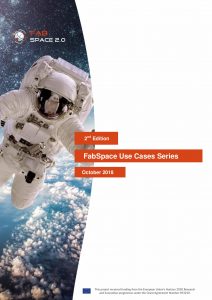On October 2018, FabSpace 2.0 published the 2nd edition of the FabSpace Use Cases Series. It is the continuation of the 1st edition and is part of the initiative of the FabSpace 2.0. Specifically, this Use Cases series is part of the activities foreseen within work package (WP) 3 – Animation and Networking for innovation and entrepreneurial discovery, which are implemented throughout the entire lifetime of the project.
WP3 is the central WP for the Daily FabSpaces animation and aim to generate awareness in the academia, research centres, companies and civil society organisations about the application uses of earth observation data and the FabSpace platform and pilot actions. It will also attenuate the boarder effect between projects ideas and start up creation by encouraging FabSpace users in making the first step toward entrepreneurship.
The second edition included five uses cases collected from various FabSpaces partners and location such as “A Semi-Automatic Classification Approach for River Shape Extraction from Sentinel-2 Imagery” developed by FabSpace Darmstadt, Germany; “Drones for Assisting Visually Impaired People by HelixVision Team” developed by FabSpace Greece; “Ships Identification by Nodalpoints Team” – this section includes the use case developed by FabSpace Greece; “Navigation system for people with physical disability” developed by FabSpace Toulouse, France, in collaboration between the IRIT department (Toulouse Institute in Computer Science) of the University of Toulouse Paul Sabatier (France) and the University of Bourgogne, Dijon (France); and “Transcribing satellite images method for people with visual deficiencies” developed by FabSpace Toulouse, France.
FabSpace aims for the use cases to showcase various ideas to use EO data and tools with the aim to attract more people from different backgrounds to generate new projects and promising business plans in the future.
Continuous improvement and more use cases would be expected in the next edition. The next edition of the use cases implemented within FabSpace partners shall be published regularly during the entire lifetime of the project. The FabSpace 2.0 project will continue on the next edition of the use cases with more challenges and categories. The project also welcomes any organisations to be involved in the development of the use cases in order to successfully implement the project findings.
Click here to download the 2nd edition of FabSpace Use Case Series.






